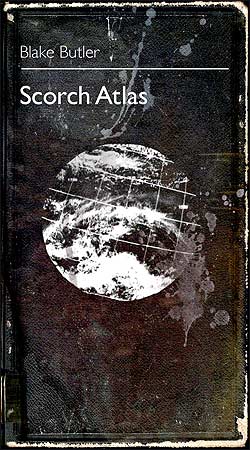
Demands of the Drowning
Blake Butler’s bleak, beating vision
by Molly Templeton
 |
Can you love a book like Blake Butler’s Scorch Atlas (Featherproof Books, $14.95)? I couldn’t read it over lunch, or before bed. I had to keep it at arms’ length. I would pick it up and read a story — each prefaced by a brief piece in which something, almost never rain, pours from the sky — and walk away again, the cadence of Butler’s sentences ringing in my ears. “The mother ate thread and lace for four weeks so that her daughter would have a gown,” begins one story. “Randall had a head the size of several persons’ heads — a vast seething bulb with rotten hair that shined under certain light,” starts the next. These sentences, smooth and disturbing, lure you in, leaving you unprepared for the rhythmic shift that occurs once the hook is set. Sentences shorten. Alliteration spikes paragraphs with hard sounds that struggle against the viscous, viceral descriptions that pour forth: too much water, mold, dark, damp; people growing rinds, their heads enlarged, their skin flaking; dogs at the door and nothing in the place where the ocean once shifted.
Scorch Atlas is a series of stories set in a ruined world. It might be a distant relation of The Road, but only in concept, and in that many of its subjects are families — and families who could not save each other even if they tried. A boy forgets his brothers, who slip under the mud that is the earth’s surface; a woman misses her son, around whom a fire began of its own accord (the seventh such fire in her house). In “Seabed,” big-headed Randall and a strange little girl walk to where the sea should’ve been. But Butler’s world isn’t so much post-apocalpytic as losing itself, drowning in an abundance of elements no one much cared for in the first place: mud, insects, sickness, death and the quiet, solitary madness that follows. In “Tour of the Drowned Neighborhood,” a narrator calmly, briefly describes the world that’s left for those who haven’t succumbed, alternately pointing out what’s there — “This is a picture window with no picture” — and instructing the reader to think of what isn’t: “Imagine shallow water blackout, heart attack, thermal shock, and stroke. The skies alive in color. No light, no sting, no sound.”
Butler’s stories wear different shapes — one like a fairy tale eating itself, an ouroboros of dead myth; one an insurance claims report; “Seabed” sitting in the middle of the book, almost hopeful — but every one accomplishes the unsettling feat of turning horror into poetry. The images are terrible, and the language is astonishing. Butler’s world is incredibly present, soaked in fear and transformation and uncontrollable forces of nature which, here, are deeply unnatural. Why, and how, would it rain flesh, ink, glitter? There’s no time or space to ask, only to absorb, and then try to shake it off, stepping out of the pages of this beautifully designed book (tinted to look ashy, rumpled and stained) and returning to the tidy, ordinary world where you may or may not sleep with visions of dead oceans and moving walls dancing in your head.
I can’t love Scorch Atlas. I think I fear it — its relentless and overwhelming vision, and the power Butler has to drill a hole in my chest with language. But Butler’s strange masterpiece doesn’t ask for your love. It demands your attention.
Blake Butler and Jamie Iredell read at 6 pm Friday, Feb. 12, at Tsunami Books. Live Lit West 4, in which UO creative writing masters’ students read from their works in progress, follows at 7 pm. Free.